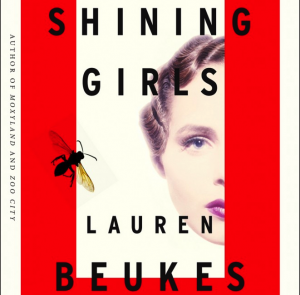Book Review – The Shining Girls
- Book Review
- Sep 13, 2013
- 0 Comments
It’s fair to say that American culture has a healthy appetite for stories about serial killers. On television Dexter is wrapping up it’s final year, The Following will return to Fox at midseason, as will Hannibal on NBC, because the populace still hasn’t tired of the titular cannibal psychiatrist after over thirty years within the public imagination. Similarly, the shelves of the mystery/crime sections of bookstores offer so many choices it would take years to get through them all. It’s not really a surprise to see the genre begin to branch out into other realms of pop fiction, most recently with Lauren Beukes’s The Shining Girls, which offers this single hook: a time-traveling serial killer.
It’s a brilliant gimmick that caused The Shining Girls to be one of the hit books of the summer. Beukes, a South African novelist, brings us the tale of Harper Curtis, a Depression-era drifter with a penchant for violence that comes across The House, this novel’s version of a time machine, that allows him to traverse 20th century Chicago snuffing out women with potential to change the world, or, as the novel puts it, ones that “shine.” Among them is Kirby Mazrachi, who survives his attack and begins to search for the killer who isn’t confined to one particular time.
Written in a style that will bring to mind 2003’s The Time Traveler’s Wife, with each chapter heading stating which part of the century the book is taking place, the central concept of the novel felt like a slight variation on a story we already know, enough to make it feel original. The circular narrative, which has a meticulously plotted time-jumping structure, could be likened to the time travel film Primer, in that one would need to create a diagram to follow how each of the stories intersect and when. Characters that begin the story as corpses are alive later in the novel, and the concept of deterministic loops that we are bound to hangs heavy over the narrative. Beukes’s version of time travel follows the law that you cannot change the past because everything that can happen has already happened. For instance, one cannot go back in time to kill Hitler because if you could, it would have already happened, and this sentence would make reference to another genocidal ruler because no one would remember a mediocre Austrian artist from the early 20th Century. It may sound complicated, but it’s not, it just appears to be.
Likewise The Shining Girls is a novel that appears to be complex but isn’t. For a novel with time travel at its core, it is remarkably linear. In a scene where Harper travels to the future to dispose of a corpse in a dumpster he discovers there is already a body in it of another character he has recently met that he will murder later in the narrative. A deeper narrative would ask the question of whether or not that later murder has to happen—if the loop can be broken—but Harper, having given himself to the whims of The House, doesn’t attempt to or even seem to care to. He goes where and when The House wants him to kill the women who “shine.” There are attempts from Beukes to deepen Harper as a character, but he never comes across as more than a stock serial killer from any other narrative. Likewise, the girls of the title, while given backstories in the chapters we meet them before their gruesome demise, are no deeper. Only Kirby gets fleshed out as a character but still remains thin as the paper she exists on.
The other glaring problem with The Shining Girls, as opposed to something like Joe Hill’s NOS4A2, which also dealt with a girl escaping a supernatural serial killer and attempting to stop him, is Beukes’s novel falls apart upon further examination. The author has stated in interviews that she did not want to explain the nature of The House and its ability to let Harper jump through time but a little explanation or even postulation from characters, however pseudoscientific or even fantastic, is necessary. It’s no spoiler to say that when The Shining Girls reaches its climax after 300+ pages of build-up it just ends like a summer blockbuster after the big action scene. And like those summer blockbusters, The Shining Girls is something that wants to convince you it is more than it is. Unfortunately, no matter how much it wants to be, the novel isn’t anything more than the same old serial killer narrative our culture loves so much trussed up with a flashy gimmick.



0 Comments
Be the first to leave a reply!